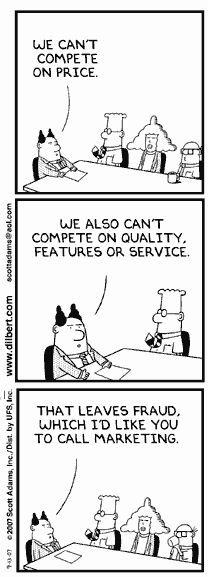 A new year, and I thought I would kick off with an irritating year-end piece from Wired magazine. On 27 December Wired ran an item reporting the supposed "10 most important scientific breakthroughs of 2007" (Wired, 27 Dec). It included this illuminating comment:
A new year, and I thought I would kick off with an irritating year-end piece from Wired magazine. On 27 December Wired ran an item reporting the supposed "10 most important scientific breakthroughs of 2007" (Wired, 27 Dec). It included this illuminating comment:"Unlike recent years, there were no high-profile cases of scientific fraud -- none that went uncovered, anyway."Clearly there have been no real concerns about science in this past year. The comment is revealing. It casts light on how we as a society view scientific integrity. I suppose it all depends on the definition of words. The working definition of research misconduct (scientific fraud) on this blog might be summarized as:
"Violation of the standard safeguards of scholarly scientific conduct or reckless disregard of the research process that places the scientific record at risk. It includes misleading the scientific community with regard to the confidence limits or origins or findings (irrespective of whether results are in any sense "correct"). It includes non disclosure of information that results in a distortion of the scientific record by inflating the importance of information which is disclosed. It includes any form of intentional deceit, trickery, or perversion of the truth, or use of a process known to lead to the likelihood of such perversion. It includes serious misrepresentation of any aspect of scientific method, procedure or authorship such that the relevance of findings is misunderstood. It includes violation of informed consent or improper use of information derived from the assumption of risk by other humans".
For the top 10 juiciest ethics scandals of the year, a few words might be worth mentioning for a start:
- Avandia (GlaxoSmithKline)
- Zyprexa (Eli Lilly)
- Seroxat/Paxil/Paroxetine (GlaxoSmithKline), study 329, and the ongoing "criminal" self non-investigation by the UK "regulators"
- NMT Medical and the Starflex trial
- Merck and Schering-Plough and Ezetimibe (Zetia)
I have no idea whether any of the above ethics scandals represent scientific fraud. They certainly are high profile. There have been a hundred "low profile" examples, each of which has been far more damaging to science and to human welfare than the activities of Eric Poehlman or Hwang Woo-suk. I look forward to a piece in Wired discussing their definition of "scientific fraud", of "high profile" and the way in which these ethics scandals represent (or do not represent) scientific misconduct.
Earlier|Later|Main Page
2 comments:
It is interesting isn't it.
Wired science represents a certain type of science. What they meant is that there was no ivory tower crime of a certain type in a certain kind of science and involving certain kinds of people.
Has the current level of scientific misconduct already become the new normal by Wired's standards?
That's scary.
Post a Comment